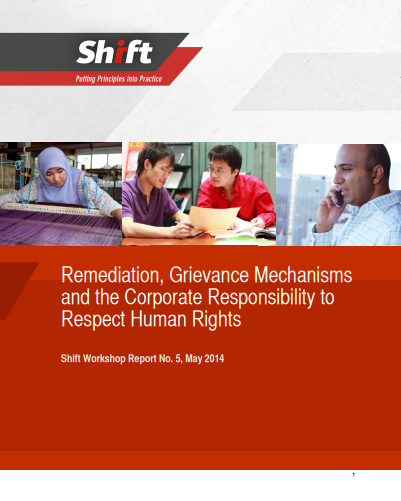Introduction
On May 1-2, 2014, Shift held the fifth in its series of workshops with companies participating in its Business Learning Program, co-hosted with the Corporate Social Responsibility Initiative at the Harvard Kennedy School of Government. The workshop focused on the concept of remedy in the context of the UN Guiding Principles on Business and Human Rights, which plays a key role in meeting the expectations of the corporate responsibility to respect human rights.
The fundamental expectations of businesses in respecting human rights are set forth in Guiding Principle 11: “Businesses should avoid infringing on the rights of others and should address adverse human rights impacts with which they are involved.” In essence, the Guiding Principles recognize that, even with the best policies and processes to prevent potential human rights impacts from occurring, impacts can still occur – whether because the impact was unexpected or because the business was unable to prevent it.
The Guiding Principles therefore articulate two distinctive types of responsibilities for businesses in respecting human rights:
• A forward-looking responsibility of businesses to prevent human rights impacts from occurring (which are captured in processes for human rights due diligence, prevention and mitigation); and,
• A backward-looking responsibility of businesses to address human rights impacts when they do occur (which are captured by the concepts of remediation and leverage).
The concept of remediation becomes critical in understanding this backward-looking responsibility to address human rights impacts when they occur.
Drawing on both the experience of participating companies and challenges they have faced in practice, together with Shift’s experience working on issues related to remediation, the workshop sought to generate both practical and creative ideas for companies on how to approach their responsibilities in relation to remediation of human rights impacts. The workshop operated under the Chatham House rule, and accordingly this report aggregates some key ideas that contributed to or resulted from the discussions.

